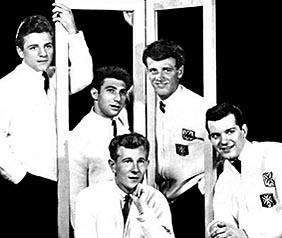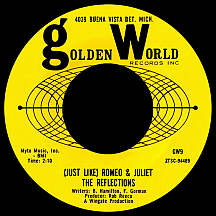THE REFLECTIONS
(Just Like) Romeo and Juliet
I'm not saying all teenagers had goofy nicknames in the 1950s, but the guys from Detroit's west side that made up the ranks of The Reflections gave it their best shot. Lead singer Tony Micale liked to be called "Spaghetti," while Phil Castrodale went by "Parrot" and Ray Steinberg preferred the tough-guy appellation "Razor." Dan Bennie and John Dean kept it simple, sticking with Danny and Johnny, respectively. They weren't the first nor the last assemblage of Reflections, as a New York group with the same name recorded for the Crossroads label around 1961 and a disco group, also from New York, recycled the tag with some measure of success in the mid-'70s. In between, Spaghetti and his buddies made the most impact of all with "(Just Like) Romeo and Juliet."
By 1963 the Motor City's Reflections, all in their early twenties, had been performing at schools and parties and on local TV shows, which led to a one-shot single for the small Kay-Ko label: "You Said Goodbye," a ballad, backed with "Helpless," a doo wop delight that, consciously or not, satirized the genre. Ed Wingate, after noting Berry Gordy's success with Motown, decided he could do it too and started Golden World Records. Freddie Gorman, a staff songwriter at Motown (and later member of The Originals), left to try his luck with Wingate's new enterprise. He and Bob Hamilton (who'd composed a few minor hits including "Am I the Man" for Jackie Wilson) came up with "(Just Like) Romeo and Juliet," suggesting a romance similar to the one so disastrously envisioned by William Shakespeare: 'If I don't find work tomorrow...it's gonna be heartaches and sorrow...our love's gonna be destroyed like a tragedy...just like Romeo and Juliet!'
Wingate had heard the earlier single by the Reflections and liked it, so he signed them to his new label. While in the process of building a studio for the company, he had a backing track recorded at Detroit's stalwart United Sound Studio. Micale and company were less than enthusiastic about the song, on paper at least, but when they heard the track, which featured top Detroit session players (including a few Motown moonlighters), they got into the spirit of it. Despite that downer of a final verse, producer Rob Reeco helped them inject the tune with an infectiously happy sound. The February 1964 release took off immediately at CKLW, the Windsor, Ontario station that ruled Detroit's airwaves, then became Detroit's number one hit in March; in April it began its ascent on the national charts and reached the top ten towards the end of May.
Meanwhile, Winnepeg, Manitoba's Chad Allen and the Reflections, unaware of the Michigan group's sudden success, received a letter from Golden World's lawyer demanding they change their name; they acceded and switched to Chad Allan and the Expressions, which Quality, their label in Canada, ultimately rejected, billing the band as Guess Who? on "Shakin' All Over," a hit the following year in the band's native land as well as the U.S.
Hot off "Romeo and Juliet," Golden World's golden boys toured with Dick Clark's Caravan of Stars and followed the big debut hit with the all-too-similar "Like Columbus Did"...but unlike Christopher's three ships, this cookie-cutter copy wasn't able to avoid sinking. Then "(I'm Just A) Henpecked Guy," complete with imitation chicken clucks, failed to find any followers later in '64, though the early-'65 track "Shabby Little Hut," varying a bit from gimmicky concepts, received considerable airplay in northeastern cities.

"Poor Man's Son," written by Hamilton, Ronnie Savoy, Steven Venet and Golden World co-owner Joanne Bratton, concerned the life and love of a blue-collar worker and may very well be the group's best effort; the more adult-sounding track made the strongest showing since "R&J" in a mid-chart spring '65 run. A cover by British band The Rockin' Berries had better luck, working its way into the U.K. top ten a few months later. Steinberg left at about this time and the Reflections continued as a quartet, making an appearance near year's end in Winter A-Go-Go, a subpar theatrical film featuring a no-name cast of "Ski Buffs and Ski Babes on the Go-Go in the Snow-Snow!"
Tony Micale left in 1966 at about the time Golden World closed up shop (Wingate, alas, hadn't succeeded in reaching the heights achieved by rival Gordy). Tony's replacement, Frank Amodeo, led a backwards charge with the predictable "Like Adam and Eve" on ABC-Paramount, but it lacked the spark that sent "(Just Like) Romeo and Juliet" soaring in '64. Micale later returned to front The Reflections throughout the coming decades.


